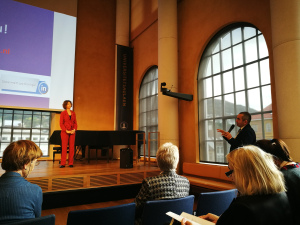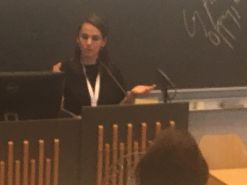Contributions to the EAHL conference
| Date: | 06 October 2017 |
| Author: | GHLG Blog |
By Yi Zhang (Eva), University of Groningen Faculty of Law, PhD Candidate, yi.zhang@rug.nl
On the 28 – 29 of September 2017, Prof. Brigit Toebes, Dr. Marie Elske Gispen and Yi Zhang participated in the 6th annual conference of the European Association of Health Law (‘EAHL’). The conference was organized by the Faculty of Law, University of Bergen, Norway in cooperation with the EAHL. The theme of the conference was health rights regulations and the distribution of healthcare in Europe.

During the EAHL conference, Professor Toebes gave a keynote lecture entitled ‘International human rights protection and the distribution of healthcare’. In her lecture, Toebes discussed the scope of the right to healthcare at the international, regional and domestic levels. Among other matters, she discussed the authoritative case law of the European Court of Human Rights. The Court increasingly engages with health matters, touching in particular on the duty of the State to oversee the quality of healthcare services as well as possibilities for redress. Toebes explained that the right to healthcare as defined internationally does not provide a comprehensive set of standards when it comes to the distribution of healthcare. Yet for example, the so-called ‘AAAQ’ provides an authoritative set of principles that are increasingly applied in the context of healthcare distribution at the domestic level, as was also evidenced by the presentations from various participants at the conference (e.g. the presentation by Professor Hartlev on personalised medicine).

Dr. Marie Elske Gispen presented her work on access to pain control and palliative care in Europe sharing findings of her previous qualitative study in Latvia. She demonstrated how the unavailability and inaccessibility of morphine and other opioid-containing painkillers lead to needless suffering in large parts of Eastern Europe. This persistent health inequity is particularly problematic in light of the increase of non-communicable diseases in Europe which, if curative care comes too late or is unavailable, simultaneously increases the need for pain control and palliative care. Gispen highlighted the relevant international legal framework comprising of international human rights and drug control norms and subsequently shared the key findings and conclusions of how the Latvian government is able to comply with its international drug control obligations whilst respecting their human rights obligations. The empirical study demonstrated that administrative and procedural drug control requirements unnecessarily obstruct adequate availability and accessibility of pain control medicines including morphine.
Yi Zhang presented her research at the PhD seminar at the EAHL conference. In her presentation, Zhang introduced China’s new health care reform model – the ‘Sanming Model’- in improving access to health care from a human rights perspective. China’s has made remarkable progress towards universal health coverage over the past two decades, including expanding its basic health insurance coverage to over 95% of its entire population. However, challenges remain. Zhang compared China’s three basic medical insurance schemes and identified huge disparities across the population and between rural and urban areas which would result in de facto discrimination in equal access to health care. Giving the remaining challenges, she proposed a rights-based approach to scaling up universal health coverage in China. Subsequently, Zhang assessed the leading health care reform model – the Sanming Model – and summarised its pros and cons in improving equal access to health care in China.
In addition to their presentations, Prof. Brigit Toebes and Dr. Marie Elske Gispen jointly chaired a session in which they explored with other EAHL members establishing an interest group on chronic non-communicable diseases and the role of law in prevention and access to adequate care.


